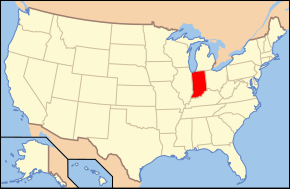Indiana wine
| Wine region | |
 | |
| Official name | State of Indiana |
|---|---|
| Type | U.S. State Appellation[1] |
| Year established | 1816 |
| Country | United States |
| Sub-regions | Indiana Uplands AVA, Ohio River Valley AVA |
| Climate region | Region III-IV |
| Total area | 35,826 square miles (22,929,000 acres)[2] |
| Size of planted vineyards | 270 acres (110 ha)[1] |
| No. of vineyards | 30[1] |
| Grapes produced | Aurore, Baco noir, Cabernet Franc, Cabernet Sauvignon, Catawba, Cayuga, Chambourcin, Chardonel, Chardonnay, Concord, Geisenheim, Gewürztraminer, Leon Millot, Marechal Foch, Merlot, Muscat Canelli, Niagara, Pinot gris, Pinot noir, Riesling, Sauvignon blanc, Seyval blanc, St. Vincent, Steuben, Traminette, Vidal blanc, Vignoles, Villard blanc, Viognier[1] |
Indiana wine refers to wine made from grapes grown in the U.S. state of Indiana. Wine has been produced in the region since the early days of European colonization in the 18th century. In the mid-19th century, Indiana was the tenth-largest winegrape producing state in the country. There are two American Viticultural Areas (AVA) in Indiana, the multi-state Ohio River Valley AVA which also expands across Kentucky and Ohio, and the Indiana Uplands AVA located entirely within south-central Indiana and resident of the state's oldest and most prolific winery since 1972, Oliver Winery.
History
[edit]Indiana was a crucial area in the early American wine industry.[3] Early attempts at grape cultivation were mainly undertaken by English immigrants, which were all unsuccessful in the production of palatable wine. French vinedressers were blamed for intentionally causing this failure even though this was not the case.[4] French cultivation of grapes started in what would be present-day Indiana by 1735.[5] Reasons that wine production failed in this era included the inability to use native grapes which were too bitter and produced less fruit),[4] the lack of mature vineyards,[4] diseases that non-native grapes were especially weak to, and a colder climate compared to Europe.[6] Vinyards were abandoned for tobacco, which was a more profitable crop.[4] More serious attempts to produce wine took place after the American Revolution but these efforts were also unsuccessful.[7]
References
[edit]- ^ a b c d "Indiana: Appellation Profile". Archived from the original on September 3, 2013. Retrieved November 16, 2007.
- ^ "State Area Measurements and Internal Point Coordinates". Census.gov. 2010. Retrieved December 2, 2023.
- ^ Butler & Butler 2001, p. n13.
- ^ a b c d Butler & Butler 2001, p. 2.
- ^ Butler & Butler 2001, p. 5.
- ^ Butler & Butler 2001, p. 3.
- ^ Butler & Butler 2001, p. 4.
Sources
[edit]- Butler, James; Butler, John (2001). Indiana Wine: A History. Indiana University Press. ISBN 978-0-253-00058-3.

